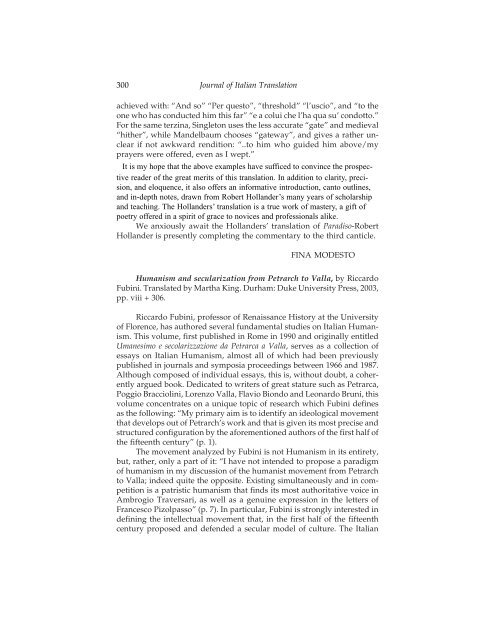Journal of Italian Translation
Journal of Italian Translation
Journal of Italian Translation
Create successful ePaper yourself
Turn your PDF publications into a flip-book with our unique Google optimized e-Paper software.
300<br />
<strong>Journal</strong> <strong>of</strong> <strong>Italian</strong> <strong>Translation</strong><br />
achieved with: “And so” “Per questo”, “threshold” “l’uscio”, and “to the<br />
one who has conducted him this far” “e a colui che l’ha qua su’ condotto.”<br />
For the same terzina, Singleton uses the less accurate “gate” and medieval<br />
“hither”, while Mandelbaum chooses “gateway”, and gives a rather unclear<br />
if not awkward rendition: “..to him who guided him above/my<br />
prayers were <strong>of</strong>fered, even as I wept.”<br />
It is my hope that the above examples have sufficed to convince the prospective<br />
reader <strong>of</strong> the great merits <strong>of</strong> this translation. In addition to clarity, precision,<br />
and eloquence, it also <strong>of</strong>fers an informative introduction, canto outlines,<br />
and in-depth notes, drawn from Robert Hollander’s many years <strong>of</strong> scholarship<br />
and teaching. The Hollanders’ translation is a true work <strong>of</strong> mastery, a gift <strong>of</strong><br />
poetry <strong>of</strong>fered in a spirit <strong>of</strong> grace to novices and pr<strong>of</strong>essionals alike.<br />
We anxiously await the Hollanders’ translation <strong>of</strong> Paradiso-Robert<br />
Hollander is presently completing the commentary to the third canticle.<br />
FINA MODESTO<br />
Humanism and secularization from Petrarch to Valla, by Riccardo<br />
Fubini. Translated by Martha King. Durham: Duke University Press, 2003,<br />
pp. viii + 306.<br />
Riccardo Fubini, pr<strong>of</strong>essor <strong>of</strong> Renaissance History at the University<br />
<strong>of</strong> Florence, has authored several fundamental studies on <strong>Italian</strong> Humanism.<br />
This volume, first published in Rome in 1990 and originally entitled<br />
Umanesimo e secolarizzazione da Petrarca a Valla, serves as a collection <strong>of</strong><br />
essays on <strong>Italian</strong> Humanism, almost all <strong>of</strong> which had been previously<br />
published in journals and symposia proceedings between 1966 and 1987.<br />
Although composed <strong>of</strong> individual essays, this is, without doubt, a coherently<br />
argued book. Dedicated to writers <strong>of</strong> great stature such as Petrarca,<br />
Poggio Bracciolini, Lorenzo Valla, Flavio Biondo and Leonardo Bruni, this<br />
volume concentrates on a unique topic <strong>of</strong> research which Fubini defines<br />
as the following: “My primary aim is to identify an ideological movement<br />
that develops out <strong>of</strong> Petrarch’s work and that is given its most precise and<br />
structured configuration by the aforementioned authors <strong>of</strong> the first half <strong>of</strong><br />
the fifteenth century” (p. 1).<br />
The movement analyzed by Fubini is not Humanism in its entirety,<br />
but, rather, only a part <strong>of</strong> it: “I have not intended to propose a paradigm<br />
<strong>of</strong> humanism in my discussion <strong>of</strong> the humanist movement from Petrarch<br />
to Valla; indeed quite the opposite. Existing simultaneously and in competition<br />
is a patristic humanism that finds its most authoritative voice in<br />
Ambrogio Traversari, as well as a genuine expression in the letters <strong>of</strong><br />
Francesco Pizolpasso” (p. 7). In particular, Fubini is strongly interested in<br />
defining the intellectual movement that, in the first half <strong>of</strong> the fifteenth<br />
century proposed and defended a secular model <strong>of</strong> culture. The <strong>Italian</strong>
















